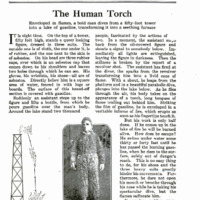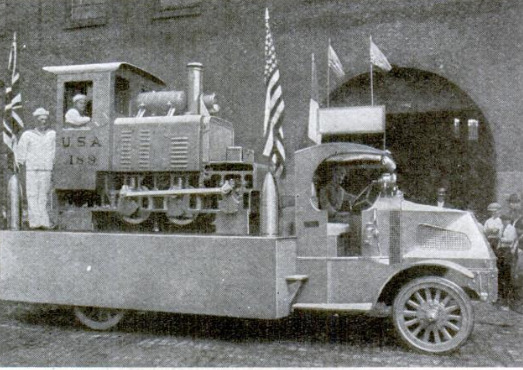Gasoline locomotive
Item
-
Title (Dublin Core)
-
Gasoline locomotive
-
Article Title and/or Image Caption (Dublin Core)
-
A Little Gasoline Locomotive to Be Used Near Front Lines
-
Caption: This little locomotive can haul several cars heavily loaded with supplies for the boys in the front trenches
-
extracted text (Extract Text)
-
IT is so vitally important to bring food
and ammunition to the front reg-
ularly and quickly that all the armies
run whole ‘military trains right up to the
trenches. A special locomotive has been
designed in America to meet the special
needs of the army. It runs on a narrow-
gage track two or three feet wide, and
hauls a long string of heavily loaded little
cars. Itisable
to turn sharp
curves at
will. Itispro-
pelled by a
four-cylinder
gasoline en-
gine, mount-
ed inside the
hood, just in
front of the
cab. The ex-
haust is dis-
charged
through the
stack. A gas-
oline exhaust
gives little or
no smoke,
and this as-
sists In keeping the little engine's move-
ments secret. Running in all sorts of
difficult places, the locomotive can ac-
complish a great deal of work, all without
revealing itself to the enemy.
How the gasoline motor is connected
with the driving wheels of the locomotive
is interesting. Imagine the cab and
other superstructure as mounted on the
front end of an automobile running
backwards, and you have the underly-
ing idea. Where the rear wheels would
be on an automobile is a small crank
mechanism, visible just under the front
“steps” of the locomotive. The four
cylinders of the motor lie lengthwise
under the hood, just as they would in an
automobile. They drive this crank
through the medium of clutches, trans-
mission, and power-shafting in the
same way as they would the rear axle
of an automobile. Power is transferred
from the crank-mechanism to the driv-
ing wheels through the aid of connect-
ing rods.
-
Language (Dublin Core)
-
eng
-
Date Issued (Dublin Core)
-
1918-01
-
pages (Bibliographic Ontology)
-
70
-
Rights (Dublin Core)
-
Public Domain (Google digitized)
-
Archived by (Dublin Core)
-
Filippo Valle
-
Alberto Bordignon (Supervisor)
 Popular Science Monthly, v. 92, n. 1, 1918
Popular Science Monthly, v. 92, n. 1, 1918



